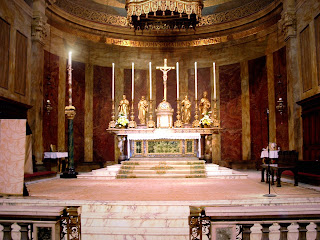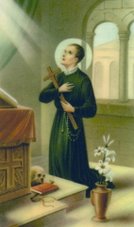It is worth reflecting on how St John wrote his Gospel, in particular the way he seems to omit the institution of the Eucharist at the Last Supper. His Gospel was the last written, and therefore assumes that the early Christian communities would have had a clear understanding of many of Jesus' actions already, both from the synoptic Gospels, and also from oral tradition. As we can see clearly from St Paul's letter to the Corinthians, the institution of the Last Supper and its relevance to the celebration of the Mass was of central importance to their communal life.
Rather, St John expounds the doctrine of the Eucharist in two clear ways: Firstly by showing how the disciples were prepared to accept the difficult idea through Jesus' early teaching in Chapter 6. Here, by the Sea of Galilee, he feeds five thousand of his followers, predicting the substantial way his own body would be multiplied to feed humanity. Next, after he had miraculously passed over to Capharnaum, He exorted those who followed Him, "
Labour not for the meat which perisheth, but for that which endureth unto life everlasting, which the Son of man will give you." He then went on to explain, "
I am the living bread which came down from heaven. If any man eat of this bread, he shall live for ever; and the bread that I will give, is my flesh, for the life of the world." Many of his followers could not fathom this statement and departed from Our Lord there and then. But the twelve disciples, although not understanding the intricacies or implications of His teaching, continued with Him, knowing that He alone had the "words of eternal life."

Next St John uses Jesus' profound example of washing the feet, which St Peter in particular found repulsive (how could a master wash his slave's feet?) in order to show us the meaning of the Eucharist. It is on the same occasion as when the other Evangelists recall Jesus' words about the bread being His Body: "after supper".
For this day of Passiontide, the emphasis shifts from penitence to joy. The ministers wear white vestments to symbolise the glory of the Mass being realised. The Crucifix is veiled in white rather than the previous colour of purple, almost highlighting that his Passion and its subsequent glory, had already begun. In the very early Church, this is the day when public penitents were reconciled with the Church through confession, after the 40 days of Lent. Incidentally, Holy Mother the Church is more relaxed in this regard nowadays, but equally acknowledges that we are
all penitents, and no longer singles out any one of us for the wearing of sackcloth and ashes!
As a special ceremony, we also see the
Maundy or Washing of the Feet, undertaken by the Celebrant (who always represents Christ at the Mass) who kneels before each one of twelve parishioners, and washes and kisses their feet with the assistance of the Deacon and Subdeacon.
The imitiation of Our Lord's love goes far beyond physically washing people's feet (although I know of many Christians who rightfully imitate this very principle, for example at the
Fireside Centre for homeless people in Birmingham). Our Lord was showing us that the love which comes from God is so pure that it is completely selfless, and always at the service of others. Thus St John also states "
In this we have known the charity of God, because he hath laid down his life for us: and we ought to lay down our lives for the brethren." For Our Lord goes on to say, "
Greater love than this no man hath, that a man lay down his life for his friends." Ultimately today is about the joy that we can call ourselves "Brethren in Christ" because he has exulted us, from mere servants of God, to friends: who know of God's plan and His love for us.Pope Benedict draws on these themes in his first encyclical Deus Caritas Est (God is Love) which seems to portray the drive of his whole pontificate:The Eucharist draws us into Jesus' act of self-oblation. More than just statically receiving the incarnate Logos, we enter into the very dynamic of his self-giving. The imagery of marriage between God and Israel is now realized in a way previously inconceivable: it had meant standing in God's presence, but now it becomes union with God through sharing in Jesus' self-gift, sharing in his body and blood.
The Holy Father draws from this principle, the way that we as believers should manifest the love of the Trinity (which is in itself, perfect love of the Holy Spirit, between God the Father and God the Son) in our charitable activities.
In my vocation of Marriage I am called to place this 'servant love' of Christ before everything else that I do. Of course that is not always easy, but true love never is. The element of sacrifice involves no longer being free to follow every whim and desire, but placing the needs of the family first. This is the only equation for happiness within marriage, and something I was reminded of by the minister at our wedding. A simple practical example is doing the washing up! A job that, rather than always palming off on others, we can embrace and perform joyfully for the sake of the spouse.
Next I will reflect on Good Friday, seeing how Jesus' example of self-giving love was made manifest in His sacrifice upon the cross, and what that greatest act of love means for us believers.






























